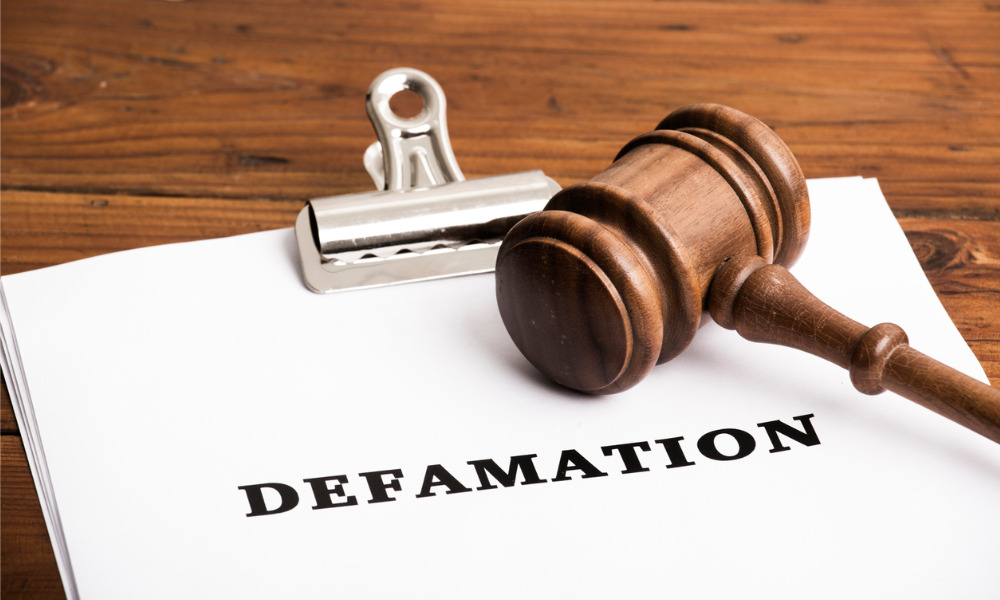When corporations or organizations are targets of malicious or libelous information, the question “can a company sue for defamation?” arises. This article will discuss the considerations when a company sues for defamation in Canada and the ways to strengthen its case.
What qualifies as defamation in Canada?
Before a company can sue for defamation in Canada, it must first determine whether the alleged statement or publication is defamatory under Canadian law.
The legal bases of defamation in Canada are found in:
- The Criminal Code
- provincial legislation
- Québec’s Civil Code
- common law, which will result in criminal or civil liability
While the Canadian Charter of Rights and Freedoms protects freedom of speech and freedom of the press, the exercise of these freedoms must be done in good faith and within the bounds of the law. Suing for defamation in Canada is based on the restriction on these freedoms under the Charter.
Before a company can sue for defamation, it’s important to clarify some terms. Libel and slander are both forms of defamation. While libel may mean defamation through written or printed material, and slander as spoken or verbal defamation, all are one and the same under Canada’s jurisdiction.
Criminal Code
Section 298 of Canada’s Criminal Code provides for the crime of defamatory libel, which is the act of publishing any matter or material which:
- will likely cause injury to the person by exposing them to hatred, contempt, or ridicule; or
- is designed to insult a person.
Under the same provision, defamatory libel may be:
- through directly expressing damaging statements; or
- implied through insinuations or ironies
Provincial legislation
A person or a company can sue for defamation in Canada based on provincial laws for libel, slander, and defamation. Here, civil liabilities such as damages may be imposed on the defendant if found guilty of committing defamation.
Some of the provinces which enacted their own legislation on libel, slander, and defamation are:
- Ontario: Libel and Slander Act
- British Columbia: Libel and Slander Act
- Alberta: Defamation Act
- Manitoba: The Defamation Act
Québec’s Civil Code
Since Québec is not a common law province, defamation under this province is governed by its Civil Code.
While Québec’s Civil Code does not have a specific provision on defamation, libel, or slander, Article 1457 of the Code will apply when a person or a company sues for defamation. Under this Article, a person is bound by law to prevent causing injury to another. When this is violated, they will be liable for damages and/or reparations whether physical, psychological, or material in nature.
Companies in Québec that sue for defamation may also consult a top defamation and media litigation lawyer as ranked by Lexpert for the unique variations regarding defamation in this province.
Common law
Canada’s common law – also called case law or legal precedents – govern when a company sues for defamation. Certain case law impacts how actions for defamation are litigated, what defenses may be set up by the defendants, and the elements of defamation that the plaintiffs must prove to be successful in suing for defamation.
Some of these prevailing cases and the doctrines are:
- Grant v Torstar Corporation: established the defense of “responsible communication” for journalists and other defenses such as:
- justification,
- fair comment,
- qualified privilege
- absolute privilege
- WIC Radio v Simpson: clarified the “fair comment” defense by establishing the requisites for its invocation.
- Hill v Church of Scientology of Toronto: the plaintiff does not have to prove malicious intent on the part of the defendant.
- Crookes v Newton: publishing a hyperlink is not “publishing” a defamatory material per se, unless a defamatory statement is found in the text of the URL.
- Black v Breeden: Canadian courts would have jurisdiction over a defamation case even if it was published outside its jurisdiction if the defamatory statements are read, downloaded, or republished within Canadian jurisdiction.
Can a company sue for defamation in Canada?
It has been established through common law that a corporation, organization, or a company can sue for defamation in Canada. This means that a corporation, organization, or a company can also be sued for defamation.
Elements of Defamation
Before a person or a company can sue for defamation in Canada, they would have the burden of proof, as plaintiffs, to establish the existence of defamation through its elements:
- that the published material is defamatory
- that the published defamatory material refers to the plaintiff
- that the defamatory material was published for the public or for people other than the plaintiff
Common law dictates that a published material will be considered “defamatory” based on the standards of a “reasonable man” or a “right-minded person”. It may be defamatory if the statements attack the company’s reputation, integrity, or competence.
The defamatory material must also refer to the company itself, whether explicit or implied.
Lastly, the defamatory material must be published publicly, either on the internet, in a newspaper, in a magazine, or any other mass media.
What is the penalty for defamation in Canada?
Under the Criminal Code, defamation is penalized by:
- Publication of libel (section 300): imposing a heavier penalty of imprisonment of not more than 5 years or a penalty for offences that are punishable on summary conviction, when the person knows that the information is false; or
- Publication of all defamatory libel (section 301): imposing a penalty of imprisonment of not more than 2 years or a penalty for offences that are punishable on summary conviction.
Common law provides for civil liabilities when a person is adjudged to be guilty of defamation, which may be one or a combination of:
- General damages: to compensate for the company’s injured reputation
- Special damages: out-of-pocket expenses, such as business losses and expenses
- Punitive damages: to penalize defendants for their defamatory acts
- Aggravated damages: to compensate the plaintiff when defamatory acts are highly oppressive
- Permanent injunction: to permanently prohibit the publishing of defamatory statements
Determined to pursue a defamation case? Hire one of Lexpert's best-ranked defamation and media litigation lawyers to advise if your company can sue for defamation





